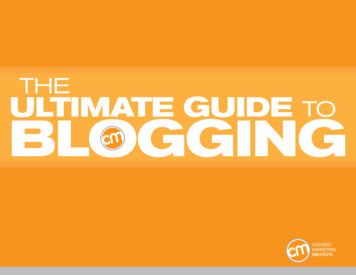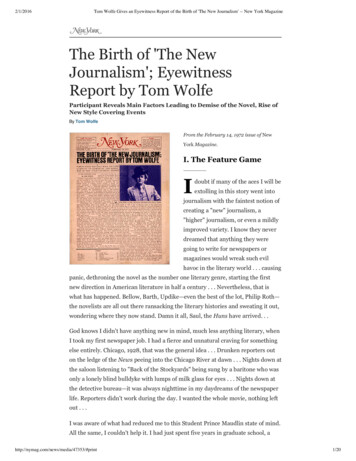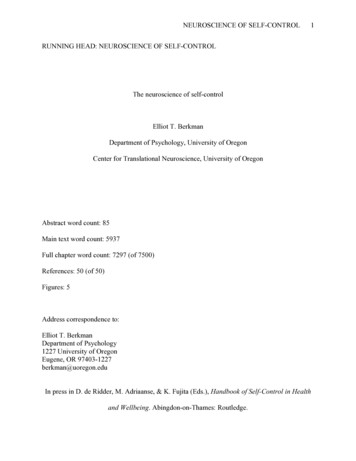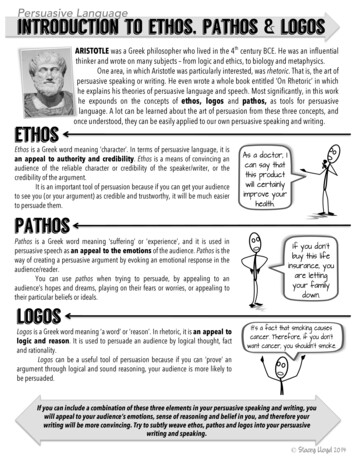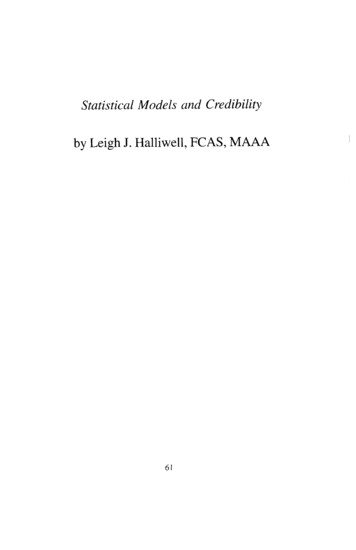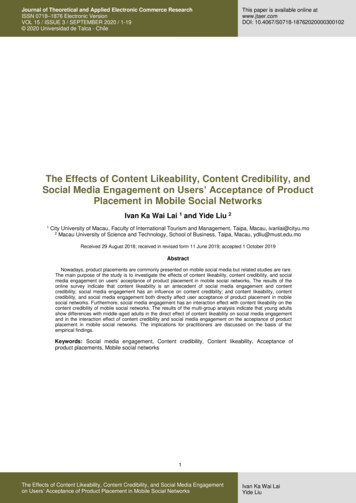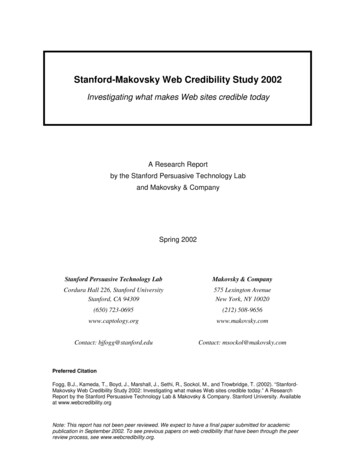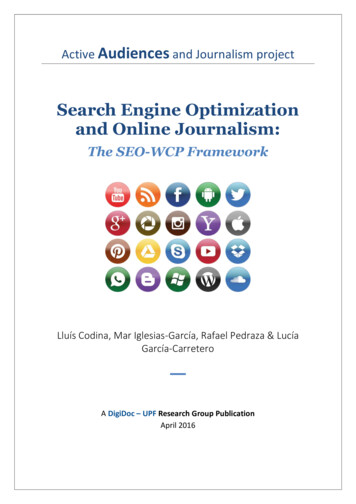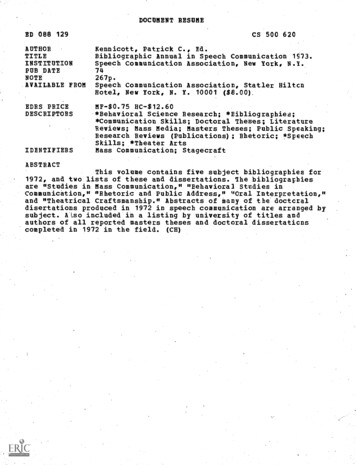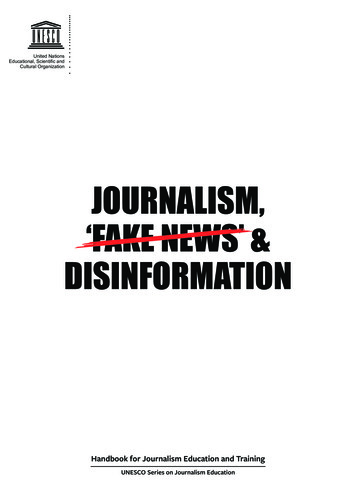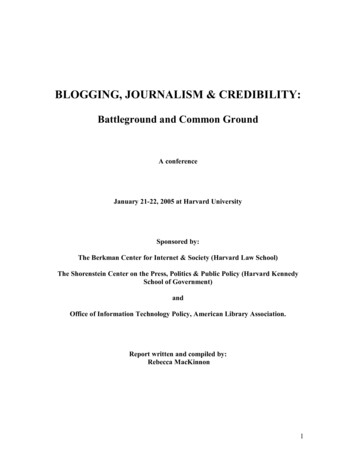
Transcription
BLOGGING, JOURNALISM & CREDIBILITY:Battleground and Common GroundA conferenceJanuary 21-22, 2005 at Harvard UniversitySponsored by:The Berkman Center for Internet & Society (Harvard Law School)The Shorenstein Center on the Press, Politics & Public Policy (Harvard KennedySchool of Government)andOffice of Information Technology Policy, American Library Association.Report written and compiled by:Rebecca MacKinnon1
Contents:1. Executive Summary . 32. The Idea . 63. The Blogosphere’s Reaction and Pre-Conference Debates . 74. The Conference . 115. SESSION 1: Jay Rosen: “Bloggers vs. Journalists” is over . 116. SESSION 2 (lunch): Judith Donath: Online social behavior and theimplications for news . 197. SESSION 3: Bill Mitchell on the ethics of journalism and blogging . 218. SESSION 4: Jeff Jarvis: The business model 259. SESSION 5 (dinner): David Weinberger speech .2810. SESSION 6 (Saturday morning): Brendan Greeley: podcasting, credibilityand non-text media .3011. SESSION 7: Gillmor and Wales: Looking to the future . 3212. SESSION 8: Wrap-up .3813. SESSION 9: Open Session . 4014. Aftermath .4215. Final Feedback .4616. Appendicesa. Papersi. Rosen .49ii. Mitchell & Steele .63b. Schedule 82c. List of Attendees . 84d. Useful links . 962
Executive Summary"Blogging, Journalism, and Credibility: Battleground and Common Ground" was aconference held in late January at Harvard, at which a group of 50 journalists, bloggers,news executives, media scholars, and librarians sat down to try and make sense of thenew emerging media environment. Since the conference, the resignation of CNN's EasonJordan and the Jeff Gannon White House incident have shown how powerful weblogscan be as a new form of citizens' media. We are entering a new era in whichprofessionals have lost control over information – not just the reporting of it, but also theframing of what's important for the public to know. To what extent have blogs chippedaway at the credibility of mainstream media? Is credibility a zero-sum game – in whichcredibility gained by blogs is lost by mainstream media and vice versa?Conference participants believed the answer, ultimately, is no. Bloggers and professionaljournalists alike share a common goal: a better informed public and a strongerdemocracy. So now what?By the end of a day and a half of discussion, the following "take-aways" emerged: The new emerging media ecosystem has room for citizens' media like blogs aswell as professional news organizations. There will be tensions, but they'llcomplement and feed off each other, often working together. (See Session 1 andJay Rosen's essay in Appendix A1) The acts of "blogging" and "journalism" are different, although they do intersect.While some blogging is journalism, much of it isn’t and doesn’t aim to be. Bothserve different and valuable functions within the new evolving media ecosystem.(This theme recurred and was reinforced in all sessions.) Ethics and credibility are key, but extremely hard to define. There are no clearanswers about how credibility is won, lost, or retained – for mainstream media orbloggers. It's impossible and undesirable for anybody to set "ethical standards" forbloggers, but it's also clear that certain principles will make a blogger or journalistmore likely to achieve high credibility. Transparency is key but isn't enough.Credibility also depends on a relationship of trust that is cultivated between themedia organization or blog and the people it aims to serve. (See Session 3 andBill Mitchell's paper in Appendix A2) Many media organizations now see blogging – or the use of some form ofparticipatory citizens’ media – as a way to build loyalty, trust, and preservecredibility. They are still experimenting with ways to do that. Examples include:o Relationships between local newspapers and local blogger communitiesOne example is the close relationship between the Greensboro News &Record and community blogging site, "Greensboro 101" (See Session 1)3
o News organizations such as MSNBC are starting their own blogs withintheir own websites, some written by their own journalists and some byguest bloggers. (See sessions 3 and 4)o Some news organizations such as Minnesota Public Radio are working tobuild databases and communication systems in order to tap the expertiseof audience members who do not blog, but who would like to help withstories. New experiments in citizens' journalism are emerging. They include:o Wikinews: an all-volunteer, distributed effort to build a new site. (SeeSession 7)o Dan Gillmor's grassroots journalism project: an effort – still underdevelopment – to harness the best of citizens' efforts with quality editingand reporting by experienced journalists. (See Session 7)o Jeff Jarvis' hyper-local citizens' media project: a news project that usesweblogs to target very specific local niche audiences. (See Session 4) Opening up online archives of news stories for free public access may makebusiness sense in addition to bolstering credibility and audience loyalty. Rightnow, most newspapers and news agencies only make their content free on the webfor a couple of weeks, and then it goes behind a paid firewall, lost to bloggers forlinking. The predominant view at the conference was that by making archivedcontent free, not only will news companies provide a tremendous social benefitand thus gain credibility, but the traffic they will receive through links to theirarchived material – and the ability to place advertising on that content – willlikely make up for the lost archive access fees. (See Sessions 4, 7, and 8)A number of questions remained unanswered, including: Are blogs (or wikis) the best way to distill and help people make sense of thegrassroots conversation bubbling up or do we need to create new and better tools? What will the new business model be? Nobody knows yet. It's likely to emergeorganically by media path breakers. How can we make the conversation more inclusive of socioeconomic groups thatare not currently involved in blogging, have little internet access, or whose livesdo not involve much internet use? How much of this conversation is relevant only to the US, and how much isrelevant to the entire world?4
Final conclusion:Strengthening the public discourse, and strengthening democracy, is indeed the commonground shared by professional journalists, bloggers, wikipedians and others involved inthe creation of grassroots media.The conference established two important things: 1) that this common ground doesindeed exist, and 2) that all are eager to work together. The goal is to create a bettersociety and better means of giving citizens both the information they need and the forumsof discourse required to hold their leaders truly accountable. Now we need to figure outhow to achieve that goal. This conference has helped point us in the right direction, butthe journey has only just begun.Please check the conference weblog at: http://cyber.law.harvard.edu/webcred formore materials and updates.5
The Idea“Blogging, Journalism and Credibility: Battleground and Common Ground” wasorganized jointly by the Harvard Law School’s Berkman Center for Internet & Society,the Shorenstein Center on the Press, Politics and Public Policy at the Harvard KennedySchool of Government, and the American Library Association’s Office of InformationTechnology Policy. 1 Alex Jones wrote in the invitation letter to attendees:Our shared motivation for convening such a conference is our conviction that theworld of journalism is being transformed by blogging, and that - similarly - theblogosphere is evolving and being transformed in the process. There can be noquestion that the phenomenon of blogging, especially blogs focused on politics andpublic affairs, has changed the way information becomes front page news.” Theexamples of Trent Lott, the Swiftboat allegations and the disputed CBS documentscome immediately to mind. In each of these cases, bloggers shaped the news, and theinfluence of blogging will only increase.To both journalism and blogging, credibility is essential. What are the areas ofcommon ground shared by these very different approaches to handling news andinformation? Can journalists who also blog do their work without conflictingstandards? Might bloggers adopt standards and a transparency that will elevate theircredibility? Our purpose is to bring together a small group of smart and thoughtfulpeople to ponder these and other related issues, which will result in a published reportand - we hope - will mark the beginning of an on-going and very important dialogue.A group of 50 people were invited. Organizers strove for a mix of professional journalistsand editors, bloggers whose work has had an impact on news events, journalists who alsoblog, academics who study the media, heads of organizations dedicated to watchdoggingor improving American journalism, and several others whose perspectives we thoughtwould be valuable. We also felt strongly that with many bloggers participating, theconference proceedings should be made fully public via live audio webcast, with a liveonline chat for people listening remotely to discuss what was being said. The scheduleand participants would also be publicized on an open weblog.The conference planning weblog, at: http://cyber.law.harvard.edu/webcred was set up inNovember. The weblog served several functions: It was the main website whereparticipants could go to check for schedule updates, the participant list, and otherannouncements.2 (See Appendices B&C) The blog was meant to serve as a resource forparticipants, with links to articles, blog-posts and other resources useful to our discussion.Participants were also invited to post directly onto the conference blog if they wished inorder to share their ideas and seek feedback as they prepared for the conference. Finally,the weblog was a way to take advantage of the wisdom and ideas of many other people1Websites with more information about these three institutions: harvard.edu/presspol/ and rmation.htm2The schedule at: p?p 3, participant list .php?p 46
out in “the blogosphere” who we were unable to invite, but who might be interested incontributing their two cents.As the date approached, Bill Mitchell of the Poynter Institute used the blog as a way tosolicit ideas and feedback for the commissioned paper he and colleague Bob Steelewould be writing and presenting at the conference: “Earn Your Own Trust, Roll YourOwn Ethics: Transparency and Beyond.”3 (See Appendix 1b for the full paper.) Differentdrafts of the paper were also posted on the blog before the conference began.4 JayRosen’s paper – written in blog form and published on his own blog, Pressthink.org –was also announced and discussed on the conference blog.5 Several of the otherparticipants who are also bloggers, including Dan Gillmor and Jeff Jarvis, used their ownblogs to generate discussion and feedback as they prepared for the conference.6 Theirblog posts were also linked-to and discussed on the conference blog.The Blogosphere’s Reaction and Pre-Conference DebatesThe conference blog received its first spike in attention from “the blogosphere” afterblogger and participant Dave Winer first linked to the list of participants (which wasitself a blog post), on January 8th with the comment “for a conference about blogging, nottoo many bloggers.”7 In less than five days, a discussion thread of 78 comments grew inthe “comments” section at the bottom of the participants’ list. Nearly all comments werehighly critical of the choice of participants: not enough bloggers, not the right kind, toomany right-leaning bloggers, etc. Beginning on the same day, discussion threadsemerged at the bottom of the “about the conference” post and elsewhere, questioning theconference’s motivations and rationale.8 Primary concerns were that members of themainstream media – who in the view of many bloggers posting comments have lost allcredibility – had no business determining standards for bloggers or judging credibility ofblogs. There was great concern that the group would pronounce a set of standards whichbloggers ought to follow, and also great concern that the conference was questioning thecredibility of blogs – which journalists, of all people, had no right to do.The “blog-storm” surrounding the conference blog grew after I wrote a post linking to ablog post by Zephyr Teachout, former internet strategist for Howard Dean's 2004presidential campaign. Writing in preparation for issues she expected to bring up at the3The blog post soliciting comments, with over 30 responses, can be found p 10.4See http://cyber.law.harvard.edu/webcred/index.php?p p 47, p p 246See Gillmor’s post on the “End of Objectivity” at:http://dangillmor.typepad.com/dan gillmor on grassroots/2005/01/the end of obje.html and Jarvis’ blogpost on “The New Economics of News” here:http://www.buzzmachine.com/archives/2005 01 17.html#008898 and here:http://www.buzzmachine.com/archives/2005 01 080/webcred/index.php?p 27
conference, she discussed the phenomenon of bloggers who get paid by politicalcampaigns.9 Linkage to this blog post unleashed a torrent of reaction, primarily fromliberal bloggers, who felt that Teachout had unfairly slandered bloggers Markos ZunigaMoulistas of the popular liberal blog, Daily Kos, and blogger Jerome Armstrong. Anumber of people challenged the accuracy of Teachout’s facts in her blog post, andaccused me – and thus the conference – of bias because I had linked to her blog post. Theview of some was that if you link to something, you are endorsing it. My response on theblog was that Zephyr had raised issues of blogging and financial disclosure that shewanted to discuss in the conference, and given that these issues were germane to theconference, I had linked to her post. Linking to a post, I said, did not necessarily equalendorsement of everything written in that post. This unleashed a debate in which I andother conference participants were accused of having no credibility, being biased, and notunderstanding blogging. This debate, however, also raised an important issue that wasdiscussed at some length during the conference: what is the blogger’s responsibility whenit comes to linking? Many bloggers link to things they find interesting but which theymay or may not agree with, or may or may not know to be true, but find worthwhilediscussing. Is this irresponsible? There is a range of views on this subject, as the preconference online debate and the conference discussion showed. 10While there were a large number of comments posted to the conference blog that couldonly be called “flames” or personal attacks on the organizers, many comments raisedimportant points about the relationship between blogging and journalism today. Onecommenter warned that to ignore the feedback is dangerous:“I don’t know if you people get it, but we’re the audience for journalism now. Other(normal) people are tuning you out. In other words, we’re giving you a hard timebecause we think what you do actually matters. Silence is the sound of indifference.”11Some of the participants who do not blog or follow blogs closely expressed amazementand fascination with the blog-storm that had descended upon the conference. Here is onereaction expressed on the conference list-serv by Jane Singer of the University of Iowa:As for the explosion of, uh, commentary on the blog, does anyone else think that thiskind of underscores the value of -- dare I say it -- "mainstream journalism"? Frankly,I've only had the time (and desire) to skim quickly through the vitriol, and I can'timagine that too many people other than the deeply impassioned would have anymotivation to do more. Don't get me wrong, I think blogs are fabulous things, for allthe reasons that everyone on this list knows.but this little adventure in conferenceplanning clearly demonstrates the benefits of a little, gulp, gate-keeping and sensemaking, no? (Yeah, yeah, Big-J journalism has plenty o'problems, but still.)9See http://cyber.law.harvard.edu/webcred/index.php?p 17 y-interested-blogging.html10More debate on the conference blog took place p?p 23 and p?p ?p 28#comment-6278
Here is part of the response by Buzzmachine’s Jeff Jarvis:There are two rants going on simultaneously, one more interesting than the other.One rant is a purely political defense of Deaniacs by Deaniacs. Been there, seenthat plenty of times, eh?But the other rant is interesting: People in this world, in turns out, assume a right toopenness and inclusion and that is manifest in their complaints about an event thatis by invitation only; they are allergic to velvet ropes and press passes andprivilege; they are the citizens and they demand an equal playing field. If you'dquizzed me a few weeks ago, I probably would have said that but in this interactionI've seen this now as the bloggers' view of their birthright and that's fascinating; it'salso an object lesson for the business.The dynamic of the online, pre-conference discussion is worth noting. We used theparticipant list-serv to ensure that participants were receiving updates and necessaryconference information that was also being posted on the blog. All participants wereurged to follow the conference blog and participate in the increasingly heated discussionsthere. However, the only participants who ended up participating on the blog in any waywere those who have blogs themselves. The non-blogger participants did not appearcomfortable, or did not feel that they had the time to engage in a direct conversation withthe blogosphere – and instead limited their pre-conference discussions to the list-serv.Occasionally, I would try to post parts of the list-serv discussion onto the conference blogso that the non-blogger participants’ perspectives could be shared more widely. I was notsuccessful in getting non-blogger participants to post their thoughts directly onto theconference blog – either in the form of full blog posts or simply as comments. One resultof this was that perceptions in cyberspace of the conference’s purpose and nature wereframed almost entirely by people who blog: the perspectives and views of non-bloggerswere almost entirely absent from the mix.In the days leading up to the conference, journalists who heard about the conferencelearned of it primarily through the blogs, and thus approached “the story” of theconference – at least initially – through the perspectives that had been most dominant inthe blogosphere. Upon interviewing organizers and participants, and observing theconference, those perspectives changed. But the lesson in early story framing is animportant one: a lesson that CNN’s Eason Jordan was soon to learn, when bloggersseized upon comments he had made in a World Economic Forum session and helpedbring about his resignation before the mainstream media even got around to reporting thestory.By having a conference blog that was being linked-to and talked about in theblogosphere, we also made it possible for people with interesting projects and ideas to“find us” – and to make us aware of things we would not have known about otherwise.Through the blog we were contacted by Martin Kuhn, a doctoral fellow at the Universityof North Carolina’s School of Journalism and Mass Communication, who unbeknownstto the organizers had written a “Proposed Code of Blogging Ethics,” which was then9
shared with the group, and which proved very useful to Bill Mitchell as he prepared hispaper on ethics.12David Berlind of ZDNet also found us through the blog. His new “transparency project”aims to make all raw materials that went into his stories – interview transcripts, notes,audio files – available openly online.13 This idea was of great interest to participants andwas discussed at some length throughout the conference.Jon Garfunkel, of Civilities.net also contacted us through the blog and attended parts ofthe conference as an observer. He has written about a proposed system for peerrecommendation and ranking of blog posts, which was something we hoped to hear moreabout at the conference.We also heard – in the comments section, the day before the conference began – from adocumentary maker named Kent Bye, whose project, EchoChamberProject.com, relies onthe distributed work of volunteers online. The potential power of distributed volunteerwork in participatory media was of great interest to many people at the d/index.php?p 20http://cyber.law.harvard.edu/webcred/index.php?p 4010
The ConferenceIn the new evolving ecosystem that combines citizens’ media with professional media,credibility can be won and lost more easily than ever. This stands for everyone, as AlexJones, Director of the Shorenstein Center, pointed out in his welcoming remarks.“Credibility is something that’s relatively fragile,” he said. “It’s something thatmainstream journalism has lost an awful lot of in the last decades – something thatmainstream journalism, traditional journalism is trying to get back.” Bloggers, on theother hand, are in the early stages of figuring out how to win and lose credibility withtheir audiences. Jones pointed out that at this early stage, bloggers’ credibility is“something that is yet to be attacked or undermined in the same way that mainstreamjournalism has by, you know, a century of use.”Carrie Lowe of the American Library Association’s Office of Information TechnologyPolicy reminded us to keep in mind the perspective of the non-journalist and non-blogger– i.e., the general public, who is trying to make sense of the rapidly shifting informationlandscape. “We would encourage you to keep the user in mind,” she said. “After all, theuser is the most important part of this equation.”Berkman Center Director John Palfrey reminded us that in the end, our conversationabout blogging, journalism and credibility is really about strengthening democracy. “Ithink a lot of what this topic is about for me is about small “d” democratic values andprinciples that are playing out on the web,” he said. He is excited by “a series ofopportunities for more voices to be heard from more places in the world by more people,at less cost, and in very interesting connective ways.” He hoped the conference would“make headway towards a common ground in the name of a greater public interest.”Session 1: Jay Rosen: “Bloggers vs. Journalists” is over(Dave Winer and Bob Giles commenting)In the conclusion of his essay written for the conference, “Bloggers vs. Journalists isOver,”14 NYU professor and "Pressthink" blogger Jay Rosen enthused: “It's an excitingtime in journalism. As the great social weave from which it arises changes form, the thingitself comes up for grabs.”Rosen’s essay argues that a new ecosystem is developing in which blogging andjournalism coexist, influence, and shape one another. Kicking off the first conferencesession, Rosen said that while “Bloggers vs. journalists” may be a dramatic peg for anews story, that is a fundamentally flawed description of what is really going on.Rosen sees three main /pressthink/2005/01/21/berk essy.html11
1. A power shift “from the producers of media to the people formerly known as theaudience.” He also pointed out the need for a new vocabulary: “terms like “audience” and“consumer” and “viewer” and “reader,” which have become threaded into journalismaren’t really that accurate for the people on the other end of the process.” Why? Becausethe audience is now talking back on the web, in the weblogs, creating its own threadwithin the public discourse.2. A loss of sovereignty, or in other words, “a loss of exclusive control. Areas that oncewere under the domain of the journalist are now not exclusively under the domain of thejournalist.” Now that it is so easy for anybody to create content on the web for little or nocost, journalists “no longer have exclusive title to the press.” Professional news mediamust now share this space known as “the press” – the mass-dissemination of discourse onmatters of public interest, which for the past century has been almost its exclusivedomain – with activists, non-profits, and random individuals who have set up their ownweblogs and websites.3. Those first two factors have caused people (especially bloggers) to challengemainstream journalism’s key ideas and principles, particularly the principle of objectivity– a principle which, Rosen says is “faltering” as an “ethical touchstone” in mainstreamjournalism today.Rosen makes a point we often forget: “Most of the leading ideas that we teach youngjournalists, that journalists learn on the job weren’t necessarily created to explain thekind of world we live in. They were created to limit liability among journalists; toprovide a way of defending against the inevitable attacks and criticisms that come tojournalists. Defensive ideas, which have worked very well for the mainstream press forabout 40 or 50 years, are now working against journalists. It’s making it harder for themto find out where they are.”The most influential bloggers (and thus one might argue – those with the most perceivedcredibility) are those who help their communities (no longer an “audience”) make senseof the jumble of information out there on the web. To do this, they are expert in “the artof linking”: pointing people to other sources of information on the web by hyper-linkingchunks of text on their own blogs to the URL web addresses of other web pages and blogposts. “If we look at tapping distributed knowledge around the web, the people whoknow how to do that are bloggers. If we look at news as conversation, which is such animportant metaphor today, the people putting that into practice are bloggers.”Thus, while bloggers depend upon the work of professional journalists that is available onthe web as raw materials for their conversations and web of links, they have created newkinds of information flows, along with the and structures and norms to deal with them.“Bloggers are developing this platform that journalists will one day occupy and that is thereason people in the mainstream press should pay attention to them,” Rosen concludes.12
Dave Winer of Scripting News was invited to respond first. 15 He agrees that the“Bloggers vs. journalists” construct is not the reality. “We have never woken up onemorning in our lives thinking about how we can get rid of the professional journalists,”he says. “If anything, we have worked hard to bring them in.” Winer hopes thatjournalists will adopt more of the principles and techniques of blogging, especiallytransparency: transparency about personal politics and biases, as well as transparencythrough the sharing of all original source materials that went into a story. It now costsvirtually nothing to put transcripts and audio files on the web, and doing so would lendcredibility to the final stories. He also pointed out that as we move away from a universewhere professionals had near exclusive control over “the press,” which made their claimto objectivity more believable, we are now in a world where the consumer of news – or,shall we say, the people who interact with the news – must triangulate between multiplepoints of view. People who read, write, and interact with weblogs have become muchmore adept than passive news consumers at triangulating information from differentsources, making their own independent decisions about what to believe and what not tobelieve. “We can combine all of our points of view and do what we call embodimenttriangulation, and get closer to understanding what real events are going on,” he said.This is the new emerging world in which journalists must learn how to function – a worldwith which bloggers are already very comfortable.Bob Giles, curator of the Nieman Foundation, pointed out that news organizations are bytheir very nature resistant to change. “The news industry’s reluctance or inability toembrace new ideas is embedded in the sort of institutional culture of the newspapers andbroadcast organizations for which we work,” he said. “The question is always raised‘How soon will we make money on this venture?’ Secondarily in the thinking is ‘Howcan this serve our audiences? How does this help us connect with our communities? Howcan we better execute our obligation for public service and public trust by finding a wayto use a new technology?’”He hopes that experiments like Greensboro 101 in North Carolina, in which a newspaperhas embraced blogging in order to re-connect and become more relevant to itscommunity, will help point the way for news organizations to change.A number of issues emerged from the discussion, as follows:New relationships forming between news media and the public:Ed Cone on Greensboro 101:16 Ed Cone, a columnist for the Greensboro News &Record, said professional journalists may think they understand blogs, but in his ow
Ethics and credibility are key, but extremely hard to define. There are no clear answers about how credibility is won, lost, or retained Πfor mainstream media or bloggers. It's impossible and undesirable for anybody to set "ethical standards" for bloggers, but it's also clear that certain principles will make a blogger or journalist
